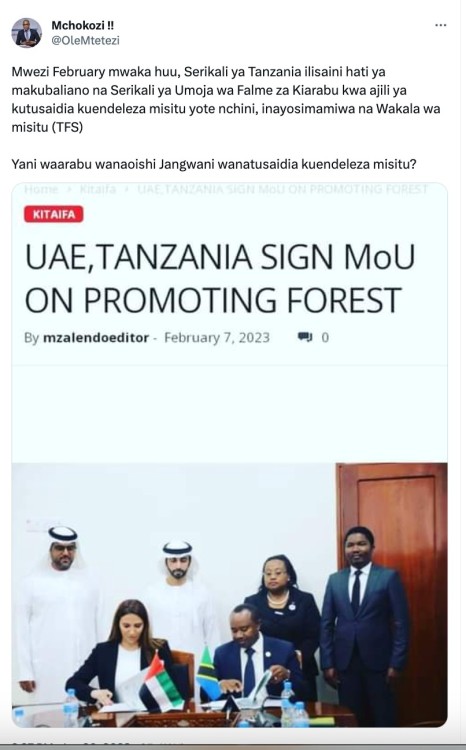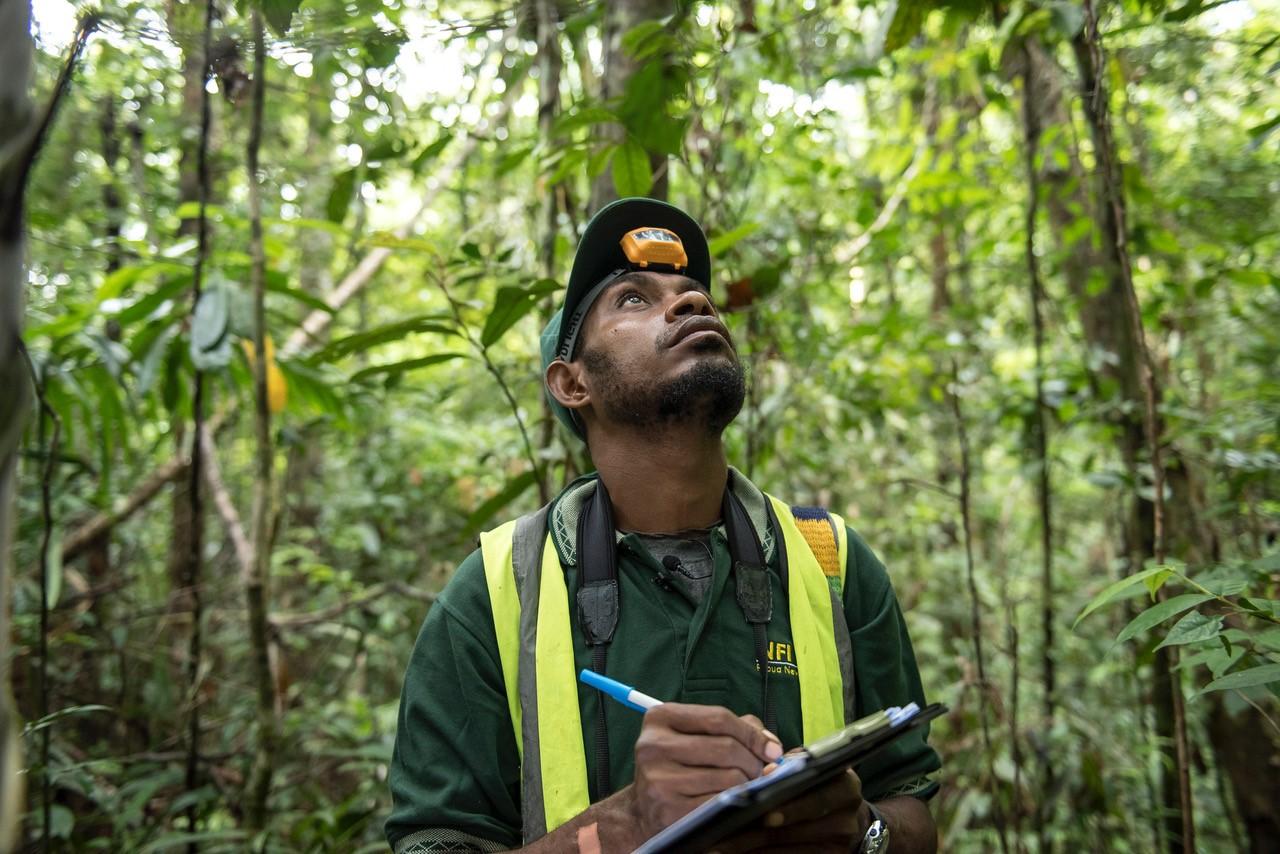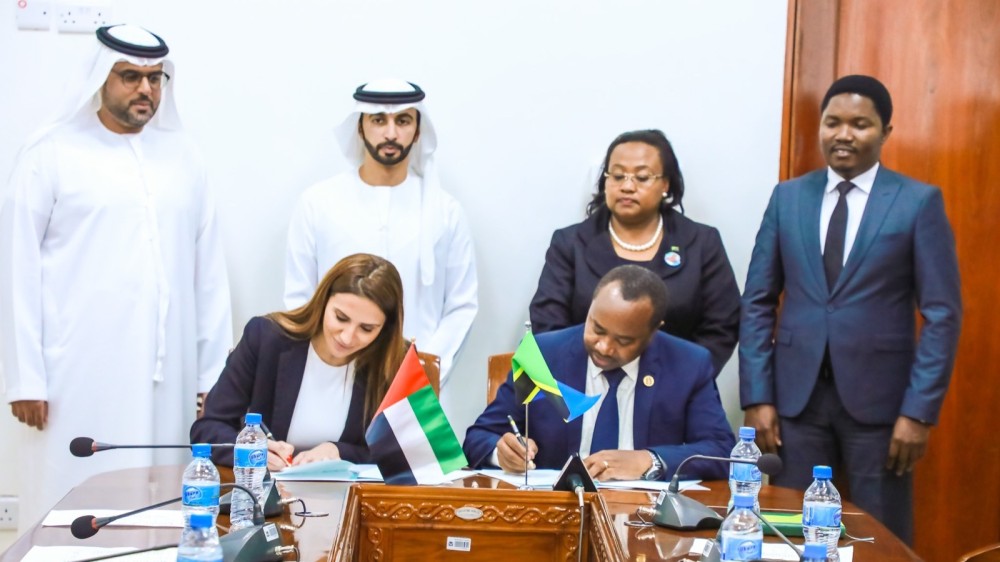As I dive into the depths of Twitter, indulging in one of my guilty pleasures, I stumble upon a hidden treasure buried within Elon’s app. A tweet from June 20 ignites my curiosity like a spark in the dark. The essence of the tweet can be loosely summarised as follows:

“In February this year, the Government of Tanzania signed a memorandum of understanding with the Government of the United Arab Emirates to help the country’s forests, managed by the Forestry Agency (TFS). That is, “The Arabs Living in Desert” are helping us with the forests?”.
Naturally, I embark on a quest for further knowledge, trusting the almighty Google to guide me through the labyrinth of information. You see, with all the buzz surrounding the Port Deal, anything remotely connected to the UAE piques my interest. And lo and behold, my search leads me to the virtual domain of the Vice President’s website, where an article from February 7, 2023, awaits my eager eyes.
It turns out that a remarkable accord was forged between the UAE-based entity known as Blue Carbon and the Government of Tanzania. A sacred pact, sealed in ink and intention, dedicated to the noble pursuit of sustainable forest management and reducing greenhouse gas emissions.
This Memorandum of Understanding (MoU) aims to inspire our fellow citizens to sow the seeds of change by planting trees and tending to our fragile environment. Moreover, it serves as a gateway to a world of tantalizing opportunities in carbon trading. The very fabric of this agreement with Blue Carbon sets the stage for a grand performance in the theater of carbon trading, encouraging developing nations to prioritize the preservation of our precious forests, not only for ecological reasons but also for the allure of economic benefits.
Ah, now the pieces of the puzzle fall into place! Carbon trading is the key that unlocks the gates to a realm where monetary value intertwines with environmental stewardship. Those mysterious “The Arabs Living in Desert” reveal their hidden prowess in navigating the intricate web of carbon trading. After all, I’ve witnessed our neighbouring nations toiling diligently, reaping the rewards of their devotion to all things green, both in spirit and currency.
Carbon Trading in Kenya
On June 14th, Reuters reported that; Saudi Arabian companies made a significant impact by purchasing over 2.2 million tonnes of carbon credits in what is being hailed as the world’s largest sale of its kind. A total of 16 Saudi firms, including industry giants like Aramco and Saudi Electricity Company, participated in the auction, paying 23.50 Saudi riyals ($6.27) per metric tonne of carbon credits.
Regional Voluntary Carbon Market Company (RVCMC), the auction organizer, disclosed that the company, established by the Saudi Public Investment Fund and Saudi Tawadul Group, plans to launch a dedicated exchange in Riyadh in the coming year. This surge in demand for carbon offsets, generated through various projects like reforestation and the adoption of cleaner cooking fuels, is driven by companies striving to achieve their net-zero emissions goals.
The auctioned credits are certified and originate from projects that employ sustainable technologies to avoid emissions or remove carbon from the atmosphere. RVCMC CEO Riham ElGizy confirmed that Saudi Airlines also participated in the auction since the credits cover offsets for airline emissions.
But what fuels this enthusiasm, you may wonder? It is the resounding call to achieve net-zero emissions goals, reverberating across corporate boardrooms. The thirst for carbon offsets, born from a desire to mitigate environmental impact, spurs these companies to invest in projects that embrace sustainable technologies. These projects, whether through reforestation endeavours or the adoption of cleaner cooking fuels, generate certified carbon credits, bestowing them with a newfound value. They hold within their essence the power to neutralize emissions or, like alchemists of old, extract carbon from the very fabric of the atmosphere.
Behold! The enigma of these “The Arabs Living in Desert” can remarkably convert forests into dollars that enriches host countries [Read Tanzania]. Maybe, just maybe, the “woke folks” are yet to grasp the intricacies of Carbon Trading. And in my civic duty as a responsible citizen, I yearn to pen a narrative, an ode to carbon trading. Within its complexity lies the potential for Tanzania, a promising avenue that could pave the way for new sources of revenue. Let us embark upon this journey, where carbon exchange becomes a means to unlock prosperity and preserve our precious planet.

Carbon Trading 101
Carbon trading, also known as emissions trading, is an innovative approach to tackle the issue of greenhouse gas emissions and combat climate change. Imagine a scenario where different companies or industries release carbon dioxide (CO2) and other harmful gases into the atmosphere while conducting their operations. These emissions contribute to global warming and have a detrimental impact on our environment.
To address this problem, carbon trading introduces a system that puts a price on these emissions. Here’s how it works: governments or international bodies set a limit, or cap, on the total amount of greenhouse gases that can be emitted within a specific period, let’s say, a year. This cap represents the maximum allowable level of emissions to prevent further environmental damage.
Now, let’s consider Company A and Company B. Company A manages to reduce its carbon emissions and emits less than its allocated cap. On the other hand, Company B finds it challenging to cut down its emissions and exceeds its cap. Here comes the interesting part: Company A can sell its unused emission allowance to Company B, allowing the latter to compensate for its excess emissions. This is where carbon trading comes into play.
Through a carbon market, Company A and Company B can engage in a transaction. Company B purchases carbon credits from Company A, representing the right to emit a specific amount of greenhouse gases. These carbon credits act as currency in the carbon trading system. Company A benefits financially from selling its surplus credits, while Company B gains the flexibility to meet its emission targets without facing penalties or restrictions.
The underlying principle of carbon trading is to incentivize emission reductions. Companies are encouraged to invest in cleaner technologies, energy efficiency measures, or renewable energy sources by putting a price on carbon. This leads to a more sustainable and environmentally friendly economy.
To illustrate this further, let’s imagine a fictional example. Imagine there are two power plants, Power Plant A and Power Plant B. Power Plant A upgrades its facility with cleaner technology, reducing emissions below its assigned cap. As a result, it earns carbon credits. Meanwhile, Power Plant B struggles to reduce emissions and exceeds its allocated cap.
In this scenario, Power Plant B can purchase carbon credits from Power Plant A to offset its excess emissions. Power Plant A, in turn, gains a financial reward for its emission reductions. This incentivizes Power Plant B to find ways to reduce its emissions in the future, either by implementing cleaner technologies or adopting energy-saving measures.
Carbon trading fosters a market-based approach to fight climate change. It encourages companies to take responsibility for emissions and offers flexibility in meeting emission targets. Ultimately, the goal is to create a greener and more sustainable future for all, where companies are motivated to reduce their carbon footprint and mitigate the impacts of climate change.
Challenges and Considerations for Host Countries
While carbon trading offers several potential benefits in combating climate change, there are also challenges that host countries [Read Tanzania] may face in implementing and managing carbon trading systems. Some of these challenges include:
- Setting an appropriate carbon price: Determining the initial price of carbon credits can be challenging. If the price is too low, it may not incentivise companies to reduce their emissions. Conversely, if the price is set too high, it could impose a significant economic burden on industries, potentially leading to job losses or competitiveness issues.
- Ensuring transparency and integrity: Carbon trading requires accurate monitoring, reporting, and verification of emissions to maintain the system’s integrity. Host countries [Read Tanzania] need robust mechanisms to track emissions accurately and prevent fraudulent activities, such as false reporting or overstating emission reductions.
- Allocating emission allowances: Allocating emission allowances to industries or companies can be complex. Decisions need to be made regarding how allowances are distributed, whether they are auctioned or given for free, and how the initial allocation is determined. Ensuring fairness and avoiding windfall profits for certain companies or sectors can be challenging.
- Market volatility and speculation: Carbon markets can be subject to price volatility and speculation. Fluctuations in carbon prices can impact the system’s effectiveness and create uncertainty for companies. Host countries [Read Tanzania] need to establish mechanisms to manage market volatility and prevent manipulation or excessive speculation.
- Impact on vulnerable communities: Carbon trading systems may have unintended consequences on vulnerable communities, particularly if they are disproportionately affected by emission reductions. For example, if emission-intensive industries relocate to other countries with less stringent regulations, it could lead to job losses in certain regions. Host countries [Read Tanzania] must consider and mitigate potential negative social and economic impacts on affected communities.
- International cooperation and harmonization: Carbon trading systems often require international cooperation and harmonization, especially in cases where emissions cross borders. Ensuring consistency in accounting methodologies, emission reduction targets, and market rules can be challenging when multiple countries are involved. Collaboration and coordination among participating countries are crucial for the success of carbon trading initiatives.
To navigate these challenges and others, the countries (Tanzania included) partner with capable global firms, like “The Arabs Living in Desert”. If you go deep enough, you will realize that almost all major businesses or deals are “cabal type” with underground connections and unwritten laws. To navigate them and obtain the best deal, one has to use those in the inner circle, and there’s nothing wrong with that.
Carbon Trading in Tanzania
Now that you have an ABC on Carbon Trading and the need to partner with consulting and management firms. What is Tanzania doing? Now I don’t have inner workings within the halls of the government. However, here are a few updates from the media that give a glimpse of what’s going on.
- July 2023, The Citizen reports that “Producing and selling carbon offsets is finally becoming a lucrative business in Tanzania, with the government reported to have attracted over 20 companies that are set to invest over $20 billion (Sh46.9 trillion). Minister of State in the Vice President’s Office (Union and Environment), Dr Selemani Jafo, said since the regulations and guidelines on carbon trading were adopted last October the investment has attracted more than $1 billion (Sh2.3 trillion), which will be mobilised annually through carbon trading across the nation.”
- In May 2023, eTurbo News Reported that “Tanzania entered into the lucrative carbon trade by signing a deal to create Africa’s largest and highest integrity carbon offset project. The Memorandum of Understanding (MOU) entered between the Tanzania Wildlife Management Authority (TAWA) and GreenCop Development PTE, Ltd., a Singapore-registered company, will develop the carbon-offset project as they seek to hook a share of the carbon credit billions to bankroll conservation of a territory covering 2.4 million hectares in Southern Tanzania.
- Recently, Daily News reported that; Tanzania set its sights on carbon trading for government revenue, targeting over 2 trillion Tanzanian shillings annually. With 21 registered companies, they aim to integrate a green economy, reduce emissions by 30-35% by 2030, and discourage deforestation. The private sector and youth involvement are crucial for employment and innovation in this transformative endeavour.
And finally, we have to bring back the MoU that sparked this article. Back in February, Blue Carbon, a UAE-based entity, has entered into a groundbreaking collaboration with the Government of Tanzania to promote sustainable forest management practices and combat climate change. The partnership aims to reduce greenhouse gas emissions and strengthen Tanzania’s efforts to preserve its vast forest resources.
The Memorandum of Understanding (MoU) between Blue Carbon and the Tanzanian Forest Services Agency (TFS) was signed, marking a significant milestone in the fight against climate change. The collaboration will initially focus on supporting the government’s initiatives to conserve and manage its extensive forest resources, spanning approximately 8 million hectares. This includes the protection of 56,000 hectares of mangroves, which are also eligible for participation in the carbon market under Article 6 of the Paris Agreement.
Prof. Dos Santos Silayo, the Conservation Commissioner for TFS, called on developed countries to contribute to reducing greenhouse gases. He hailed the MoU with Blue Carbon as the beginning of a series of activities culminating in the registration process and compliance with the agreed-upon instructions. Furthermore, Prof. Silayo encouraged developing countries to prioritize forest preservation, as it lays the foundation for engaging in carbon trading—a lucrative economic alternative. Carbon trading has become valuable for countries balancing economic growth with environmental sustainability.
Final Note
In a world where environmental consciousness intertwines with economic ambitions, Tanzania and Global partners such as Blue Carbon, GreenCop, and others have set their sights on carbon trading. While these companies astound the world with the largest sale of carbon credits, Tanzania seeks to tap into this lucrative market as a new source of government revenue. With aspirations of earning trillions of Tanzanian shillings annually, Tanzania aims to build a green economy, reduce emissions, and discourage deforestation. The private sector and youth are key players in this endeavour, offering employment opportunities and driving innovation. As the global stage embraces the concept of carbon trading, these partnerships forge their paths towards a sustainable future where carbon exchange becomes a catalyst for both environmental protection and economic growth.
Read other Opinion Posts by Editor – at – Large

